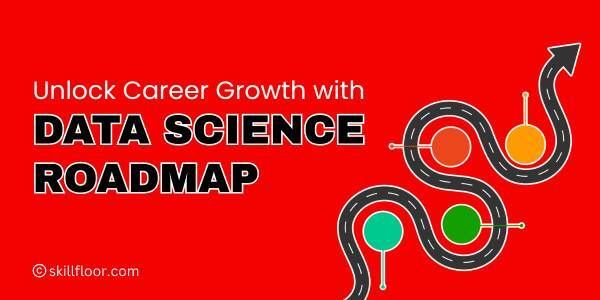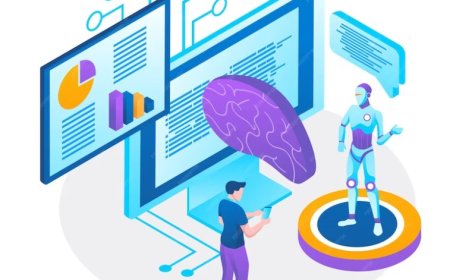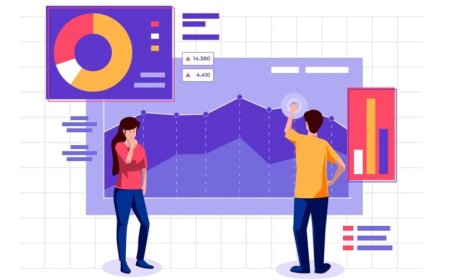The Power of Data Science: Your Eligibility Guide
Discover the future of data science and unlock its power with our comprehensive guide. Learn about data science eligibility and embark on a journey of limitless possibilities

Welcome, aspiring data enthusiasts! Have you ever wondered what it takes to embark on a thrilling career in data science? The world of data science is filled with endless possibilities, but before you jump in, it's essential to understand the eligibility criteria that can set you on the path to success. In this friendly blog, we will explore the key requirements and skills that make you eligible for a career in data science. Whether you're a recent graduate, a professional looking for a career change, or simply fascinated by the power of data, this guide will provide valuable insights to help you unlock the doors to the captivating world of data science.
Passion for Data and Problem-Solving
At the heart of every data scientist lies a burning passion for data and a genuine excitement for solving complex problems. To be eligible for a career in data science, it's crucial to have an innate curiosity and a deep interest in understanding how data can drive insights and solutions. Data scientists thrive on the challenge of uncovering patterns, extracting meaningful information, and making data-driven decisions. So, if you find yourself drawn to the potential of data and get excited about diving into complex problems, you already possess a key eligibility criterion for data science.
Strong Analytical and Mathematical Skills
Data science is a discipline that heavily relies on analytical thinking and mathematical prowess. To be eligible for a career in data science, you need a strong foundation in quantitative analysis and mathematical concepts. This includes having a solid understanding of statistical methods, probability theory, and algebra. Additionally, having a knack for critical thinking and logical reasoning is essential for approaching data problems and formulating hypotheses. The ability to think analytically and apply mathematical principles to real-world scenarios is a fundamental requirement in data science. If you enjoy exploring patterns, making connections, and finding logical solutions, you're well on your way to meeting the eligibility criteria for data science.
Programming Skills
Data scientists often work with large datasets and complex algorithms, which require proficiency in programming languages. Python and R are two popular programming languages used extensively in the field of data science. Having a good command of at least one of these languages is highly beneficial. Familiarity with data structures, algorithms, and their implementation is also important for efficient data manipulation and analysis. Data scientists use programming to clean, preprocess, and wrangle data, as well as to build and deploy machine learning models. If you have a passion for coding, enjoy solving problems through programming, and are willing to learn and explore new technologies, you're ticking another box on the eligibility checklist for data science.
Data Handling and Manipulation
Data comes in various formats and requires preparation before analysis. As a data scientist, you should be proficient in handling and manipulating data. This involves skills such as cleaning and preprocessing data to remove inconsistencies and missing values, understanding different data formats like CSV, JSON, and SQL, and having a grasp of database management systems. Additionally, data visualization is a critical aspect of data science, as it helps in presenting insights and findings to stakeholders effectively. Proficiency in data visualization tools and techniques allows you to create visually appealing and informative representations of data. If you enjoy working with data, have an eye for detail, and can transform raw data into meaningful information, you're well on your way to meeting the data handling and manipulation eligibility criteria.
Knowledge of Machine Learning Concepts
Machine learning is an integral part of data science, as it enables the development of predictive models and the extraction of insights from data. To be eligible for a career in data science, you should have a solid understanding of machine learning concepts. This includes knowledge of supervised, unsupervised, and reinforcement learning, as well as regression, classification, clustering, and dimensionality reduction techniques. Evaluating and interpreting machine learning models is also crucial for data scientists. Being able to select appropriate models, optimize their performance, and understand their limitations is a vital skill. If you find joy in unraveling the mysteries of machine learning and are passionate about leveraging algorithms to extract insights from data, you're on the right track to meeting the eligibility criteria for data science.
Domain Knowledge and Curiosity
Data science is not just about crunching numbers and algorithms; it's also about applying data-driven insights to solve real-world problems. Having domain knowledge in a specific industry or being willing to learn about various industries is a valuable eligibility criterion for data science. Understanding the context and nuances of the industry you're working in allows you to apply data science techniques effectively and derive meaningful insights. Curiosity plays a vital role in data science as well. The field is constantly evolving, and staying curious about the latest advancements and trends is essential. By cultivating domain knowledge and embracing a curious mindset, you're expanding your eligibility for data science and opening doors to a multitude of exciting opportunities.
Communication and Collaboration Skills
Data science is a collaborative field that requires effective communication with both technical and non-technical stakeholders. As a data scientist, you need to be able to communicate complex ideas and insights in a clear and concise manner. Strong written and verbal communication skills are essential for presenting findings, explaining technical concepts, and collaborating with diverse teams. Working in multidisciplinary environments and collaborating with professionals from different backgrounds is a common scenario in data science. Therefore, having strong teamwork and interpersonal skills is crucial for effective collaboration. If you possess excellent communication skills, enjoy working in teams, and can bridge the gap between technical and non-technical stakeholders, you're on your way to meeting the eligibility criteria for data science.
Education and Academic Background
While not mandatory, having a solid educational foundation in a relevant field can greatly contribute to your eligibility for data science. A bachelor's or master's degree in computer science, mathematics, statistics, or engineering provides a strong basis for understanding the core concepts of data science. Academic programs often cover topics such as statistics, programming, and algorithms, which are vital for a career in data science. Additionally, pursuing higher education or specialized courses in data science can further enhance your knowledge and expertise in the field. However, it's important to note that practical experience and hands-on projects can also compensate for a formal degree. So, whether you have an academic background or not, remember that your passion, skills, and practical experience are equally valuable in data science.
Industry Experience and Practical Project
Gaining practical experience and working on real-world projects is invaluable in the field of data science. While it may seem challenging to find industry experience at the beginning of your data science journey, there are various ways to gain practical exposure. Internships, research projects, or academic collaborations provide opportunities to apply data science techniques in real-world settings. These experiences help you understand the challenges and nuances of working with data in specific industries. Additionally, completing practical projects independently or as part of online courses or bootcamps allows you to showcase your skills and demonstrate your ability to solve complex problems. Building a portfolio of projects that highlight your achievements and capabilities is a great way to boost your eligibility for data science.
Professional Certifications and Courses
Professional certifications and specialized courses are an excellent way to enhance your knowledge and credibility in the field of data science. There are numerous online platforms, such as Coursera, edX, and Kaggle, that offer data science courses and certifications. These programs provide hands-on experience with data science tools, techniques, and methodologies. Completing relevant certifications showcases your commitment to continuous learning and validates your skills to potential employers. Additionally, staying up to date with advancements in data science through certification programs demonstrates your dedication to professional growth. While certifications are not the sole determinant of eligibility, they can certainly boost your profile and make you stand out in a competitive job market.
Networking and Community Engagement
Networking and community engagement play a vital role in expanding your eligibility for data science. Engaging with the data science community through online forums, social media platforms, and professional networks allows you to connect with like-minded individuals, share knowledge, and gain valuable insights. Participating in data science events, conferences, and meetups provides opportunities to meet industry professionals, learn from their experiences, and potentially find mentors who can guide you in your data science journey. Networking not only opens doors to job prospects but also helps in staying updated with the latest trends and advancements in the field. By actively engaging with the data science community, you'll be nurturing relationships, expanding your knowledge, and further solidifying your eligibility for data science.
Soft Skills and Personal Attributes
In addition to technical skills, certain soft skills and personal attributes are highly valuable in the field of data science. Critical thinking, problem-solving, and logical reasoning skills are essential for approaching data challenges and formulating effective solutions. Adaptability and a willingness to learn new tools and technologies are crucial in a rapidly evolving field like data science. Cultivating a strong work ethic, attention to detail, and a passion for continuous improvement allows you to excel in your data science endeavors. Creativity and innovation play a significant role in data science as well, as they drive the exploration of new approaches and methodologies. By honing these soft skills and embracing personal attributes, you're elevating your eligibility for data science and positioning yourself as a well-rounded data professional.
As you can see, the field of data science requires a combination of technical skills, educational background, practical experience, and personal attributes. Remember, eligibility criteria are not set in stone, and each individual's journey may differ. Assess your strengths and areas of improvement, and don't be discouraged if you don't meet all the criteria initially. With dedication, continuous learning, and a growth mindset, you can bridge any gaps and excel in the field of data science. Embrace the opportunities for education, practical projects, networking, and personal development. Let your passion for data and problem-solving drive you forward. May your journey in data science be filled with exciting discoveries, meaningful insights, and rewarding achievements. Best of luck on your data-driven adventure!




























































